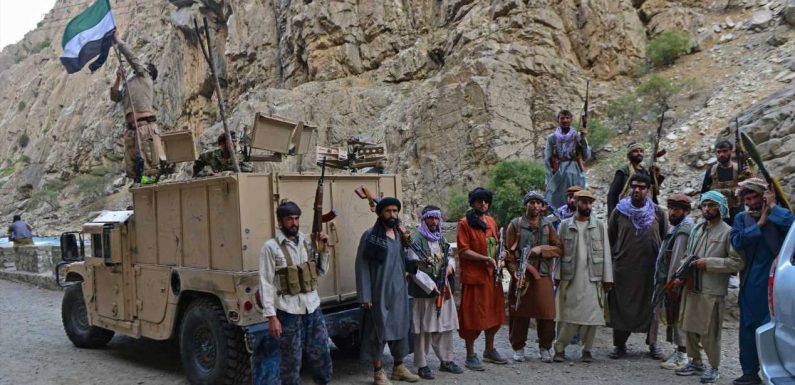
TALIBAN are set to bombard the Lions of Panjshir resistance with suicide bombers in a bloody battle over the last region holding out against the extremist group.
Resistance fighters in Afghanistan's Panjshir Valley said Friday they were battling to repulse "heavy" assaults.
Efforts to strike a peace deal between the two sides have failed, and the Taliban seek to capture the last holdout province since they seized control of the rest of Afghanistan in August.
"The Taliban have a significant advantage," said Nishank Motwani, an Afghan analyst based in Australia, saying the Islamists were emboldened by their recent victories.
"They are very well armed, and they have the psychological factor in their favour in that they precipitated the fall of the government so quickly."
The Taliban seized an enormous arsenal of weapons and military kit that the now departed US provided to the defeated Afghan army, as well as the support of prisoners they freed from jails.
"The Taliban also have shock troops, including the use of suicide tactics," Motwani added.
Fighters from the National Resistance Front (NRF), made up of anti-Taliban militia fighters and former Afghan security forces, are understood to have significant weapon stockpiles too in the valley, which lies around50 miles north of Kabul.
Thousands of anti-Taliban fighters have gathered in the 1,400 square mile bastion – and have become known as the "Lions of Panjshir."
They are one of the final pockets of organised resistance since the Taliban steamrolled to power after the US withdrawal.
On Wednesday, senior Taliban official Amir Khan Muttaqi issued an audio message to say their forces had surrounded the valley, calling on the people of the Panjshir to tell fighters to lay down their arms.
"Those who want to fight, tell them it is enough," Muttaqi said.
But many Afghans are terrified of a repeat of the Taliban's harsh rule from 1996 to 2001.
HEAVY FIGHTING IN PANJSHIR
The new rulers have pledged this time they will be more accommodating, but many in Panjshir are deeply sceptical.
Hours after their warning, Taliban forces launched renewed attacks including from the south of Panjshir from Kapisa, as well as from the Khawak pass to the west of the valley.
Both sides have claimed to have inflicted heavy losses on their rivals but communications are difficult in the valley amid the fighting.
A spokesman for the NRF, Ali Maisam Nazary,said on Friday there had been more attacks by Taliban forces overnight.
"There is heavy fighting in Panjshir," Nazary said. "He (Massoud) is busy defending the valley."
Massoud is the son of the late guerrilla commander Ahmad Shah Massoud, dubbed the "Lion of Panjshir" for holding out first against Soviet and then Taliban forces when they were power before.
In a statement Wednesday he said that the Taliban had offered them "one or two seats" in their new administration, but he had rejected the deal.
"The Taliban have chosen the path of war," Massoud said.
The 70-mile-long valley surrounded by jagged snow-capped peaks offers a natural military advantage, since defending units can use high positions to ambush attacking forces below.
But the conflict appears to be escalating, Martine van Bijlert, of the Afghanistan Analysts Network, warned.
The Taliban have chosen the path of war
"Taliban forces have been massing around the entrance to the valley but have been hit in ambushes and have sustained casualties," he wrote in a recent analysis.
"Whereas both sides mainly seemed to be trying to hurt each other in order to strengthen their hand in negotiations, without starting an all-out battle, according to the latest reports, the Taliban are now summoning forces from other provinces."
Meanwhile, sources claim Mullah Baradar will become the leader of Afghanistan's new government, reports Sky News.
Mullah Mohammad Yaqoob, the son of late Taliban founder Mullah Omar, and Sher Mohammad Abbas Stanekzai are also expected to take senior roles in the government.
The Panjshir — mainly inhabited by ethnic Tajik people — has immense symbolic value in Afghanistan as the area that has resisted occupation by invaders in the past.
For Afghans opposed to the Taliban, the holdout province stands as a symbol to show the hardline Islamists are not the welcome rulers of all Afghanistan, Motwani said.
"It gives hope to those Afghans who have lost almost everything in a blink of an eye," he said. "It is somewhere where people can go outside Taliban rule."
We pay for your stories!
Do you have a story for The Sun news desk?
Email us at [email protected] or call 02077824104. You can WhatsApp us on 07423 720 250. We pay for videos too. Click here to upload yours
Click here to get The Sun newspaper delivered for FREE for the next six weeks.
Source: Read Full Article




